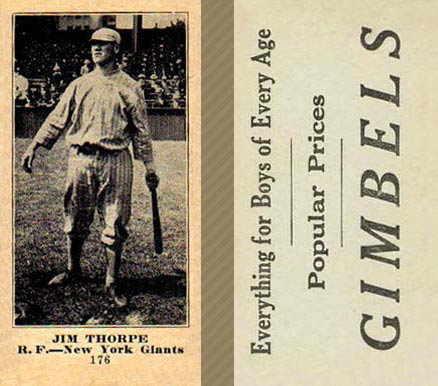 |
| Jim Thorpe, 1916 NY Giants |
"He couldn't hit a curve ball." So said John McGraw, Jim's domineering and pennant-winning manager at the New York Giants baseball team. The judgment stuck, clinging to Jim's story and reputation like a sharp old barnacle.
Jim came to the Manhattan team in the wake of one of the biggest sports scandals of the century (The 2011 World Almanac, almost 100 years after the fact, still puts it at the top of the list of worst sports scandals): Seven months after winning, with huge margins, both the pentathlon and decathlon at the 1912 Stockholm Olympics, and playing a 1912 football season for the Carlisle Indian Industrial School team that would have won him, Sports Illustrated would later suggest, the Heisman Trophy had it existed back then, Jim was summarily stripped by the AAU of his two gold medals and his amateur status.
Why? He had played professional baseball with minor league teams in 1909 and 1910. So? "Simon pure" amateurism was the sports ideal of an elite determined to exclude, in effect, the lower classes. Anyone who had ever accepted payment of any kind for playing sports was deemed a pariah and demoted to the grubby rank of professional.
Pre-Babe Ruth, the Giants were the Yankees of their day. Jim accepted McGraw's lucrative offer in January 1913. Baseball was his weakest sport, but that didn't matter. He was a huge gate attraction.
You can read in detail about the fraught McGraw - Jim relationship in NATIVE AMERICAN SON. What is important here is that Jim had to learn to play baseball, the sport that can frustrate even the finest athletes in other sports.
By the summer of 1919, sold by McGraw to the Boston Braves because "he couldn't hit a curve ball," Jim was the leading batter of the National League. At one point that summer, he was hitting better (.375) than Ty Cobb in the American League (.350). He could now hit anything, from left- (.333) and right-handed (.316) pitchers.
An injury took him out of the running in August, but for the rest of his life he would say of that 1919 season, when he batted .327: "I must have hit a few curves."


